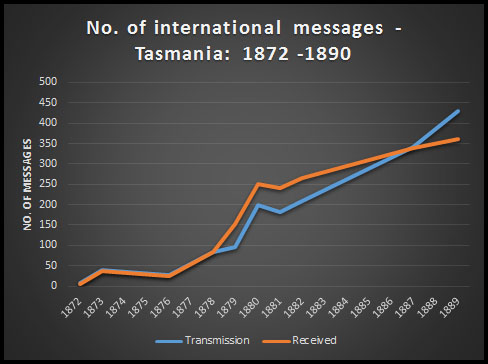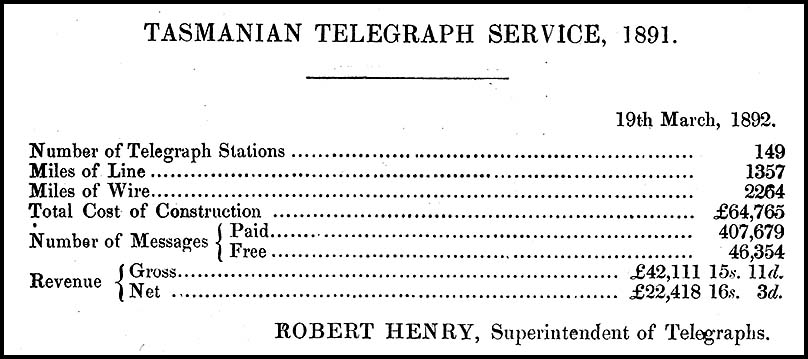Overview of developments.
- Australia 1901-1988
- New South Wales
- Overview of NSW
- Telegraph lines
- Telegraph Offices
- Date stamps
- Forms
- Envelopes
- Instructional annotation
- Collect
- Delayed
- Free
- Immediate Urgent
- Reply paid
- Rates
- Stamps
- 1871 Telegraph stamps
- 1885 proposal
- 1893 proposal
Summaries are provided below for:
- construction of the major telegraph lines;
- the Legislation for and the administration of the Telegraph Department in Tasmania;
- the dates for new developments in telegraph forms and date stamps;
- extent of use of the telegraph lines -
domestic use;
early international use.
| December 1856 | The Electric Telegraph Act passed. |
| 8 July 1857 | First telegraph line in Tasmania opened (Launceston to Hobart). |
| 18 August 1859. | First line (cable) to Victoria operational. |
| 24 January 1861 | First cable to Victoria abandoned. |
| 30 April 1869 | Second cable to Victoria opened - with subsequent duplicate cables in 1885 and 1909. |
| 1882 | A third line installed to link Hobart and Launceston with duplex instruments installed. |
2. Legislation and Administration of the Tasmanian Telegraph Department;
| First telegraph legislation: | |
| 1857 | "The Electric Telegraph Act 1857" - created the Telegraph Department which was organisationally placed within Public Works. |
| 1857 | Mr. W. H. Butcher - the senior partner in the company which erected the first telegraph line - was appointed as the first Superintendent of Telegraphs. His brother (G. B.) was appointed as operator in Launceston. |
| February/ March 1858 | Butcher (W.H.) resigns as Superintendent of Telegraphs to join the company which had won the contract to lay the first cable to Victoria. His brother was appointed as Superintendent of Telegraphs. |
| 1875 | Rules and Regulations for Offices in the Department. |
| 1894 | Telegraph Department merged with the Postal Department to form the Post and Telegraph Department. |
| Earliest recorded forms: | |
| Transmission form: | 6 March 1863 at Greenponds (TC-TO-1). |
| Delivery form: | 24 February 1860 at Launceston (TC-DO-1). |
| Urgent rate reference (IMMEDIATE): | 4 November 1863 on delivery form from Longford to Launceston (TC-DO-1B). |
| Stamps required to pay telegram charges: | (probably) 1 January 1896. |
| Earliest use of a Telegraph date stamp: | 21 November 1874 at Telegraph Office. |
| Earliest use of a date stamp on a telegram form: | 3 October 1874 at Green Ponds. |
Domestic
Telegraph Offices were opened with increasing frequency although the distances between neighbouring offices became closer - sometimes less than 10 km apart. Although there may be good geographical reasons for such proximity in some cases, there was an over-abundance of Telegraph Offices which in turn developed a financial pressure on the Department of Telegraphs.
A summary of the number of stations and the length of telegraph wire is as follows:
| Year | No. of Stations | Miles of wire |
| 1871 | 14 | |
| 1877 | 45 | 720 |
| 1887 | 119 | 1,773 |
| 1897 | 160 | |
| 1900 | 202 |
An Extract from the 1892 Intercolonial Postal and Telegraphic Conference held in Hobart during March 1892 included the following summary for Tasmania on page 86:
 |
After telegraphic connection was made to complete the line from Adelaide to Europe, the demand for the international service grew steadily - despite the high rates charged.
The graph shows a constant rise in demand especially after the 10s 6d. per word rate was introduced in 1876. The data on which the graph is based are included elsewhere. |
